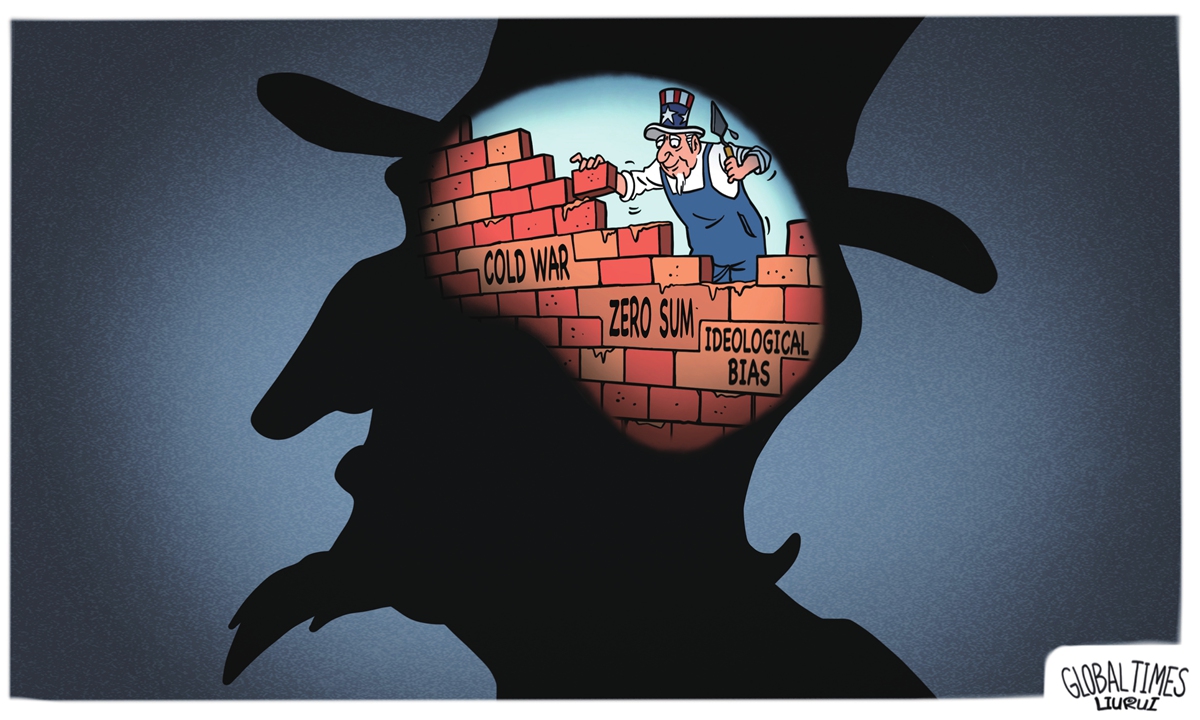
Illustration: Liu Rui/GT
If recent developments in the three major areas of politics and diplomacy, international trade and economics, and military in the US are looked at together, there will be a chilling discovery. This week, the leaders of the US, Japan, and South Korea will hold a meeting at Camp David, a retreat of US presidents. This kind of summit is the first in the history of these three countries, and its target against China is no longer concealed. According to reports from Japanese media, Japan and the US will also agree this week to jointly develop an interceptor missile "to counter hypersonic warheads being developed by China, Russia and North Korea." As for the executive order on introducing investment restrictions on China recently signed by US President Joe Biden, its negative impacts are spreading and fermenting.
The actions and policy measures of the US mentioned above are all marked by a strong "new Cold War" color and exhibit a trend of continuity and escalating intensity. Can they be characterized as "new Cold War" thinking or actions? This can be discerned through the following four criteria. First, is it confrontational zero-sum competition or cooperative mutual benefit? Second, does it involve ideological delineation or equal exchange, mutual learning, and peaceful coexistence among different civilizations? Third, does it create cliques and alliances for confrontation or does it promote openness, inclusivity, and the construction of a community with a shared future for mankind? Fourth, does it resort to containment and suppression against perceived competitors, or does it engage in benign competition within the scope of international rules and principles? Upon comparison, the answer becomes self-evident.
Just as the drumbeats of the "new Cold War" are becoming more frequent and the smell of gunpowder more suffocating, prominent figures in the White House, including President Biden, have been emphasizing on various occasions that the US "does not seek a "new Cold War"," that "the US must reject neo-containment," and that "Washington should learn from the lessons of the Cold War and the old Cold War construct of blocs is not coherent." This has created a strange scene where there is not just a departure but even a contradiction between the actions and statements of the US, as well as between US self-assessment and the real impressions of the outside world about it. This issue goes beyond American hypocrisy or lack of self-awareness; it harbors a significant underlying risk.
There are at least two possibilities. The first one is that the US knows it is engaged in a "new Cold War" and is well aware that people all around the world, including Americans, strongly oppose and are deeply concerned about a "new Cold War." In other words, the US realizes that this is a highly risky undertaking and therefore would never admit to it. Instead, it might label its actions with a new term to deceive the world.
The second scenario is that the US has actually initiated a "new Cold War," but it does not really think that it is engaging in a "new Cold War." This will have more serious consequences than the first scenario, because the US not only refuses to make a reflection and change its course, but also will gain a stronger "moral drive" from self-hypnosis. In order to wake the US up from its pretended or genuine sleep, the international community needs to strengthen its resistance and criticism against the US' initiation of a "new Cold War" and take actions.
Regardless of what the US diplomatic strategists say or think, their actions speak louder. When faced with international challenges, especially when dealing with countries that have similar power with the US but different political and cultural backgrounds from the US, they habitually and unconsciously refer to the Cold War experience. They sometimes even directly resort to Cold War tactics, without taking off the "Cold War glasses" to view the world and era that have already undergone tremendous changes, even though they may also know that this is wrong and dangerous.
An article in the American magazine Foreign Affairs points out that Cold War history has become a straitjacket constraining how Americans perceive the world, including making Americans struggle to understand gray areas between friend and foe, making negotiations with rivals appear to carry impossibly high stakes and making it hard for Americans to imagine a less-militarized foreign policy.
The deeper the misunderstandings of history and reality, the stronger the limitations and misguidance of Cold War thinking on American foreign policy decision-makers. Binary thinking makes it impossible to understand the complexity and richness of a multipolar world, and severely lacks imagination for the future. The diplomatic strategies and approaches formulated based on this have distorted international politics.
More specifically, Washington has misunderstood history, misjudged the times, and misunderstood the Communist Party of China and the Chinese people. The destructive power of "new Cold War" is world-class, and the fate of all humanity stands at a crossroads. American political elites may believe that the US was the winner of the Cold War, which is controversial, but it is certain that the US cannot be the winner of the "new Cold War" and must bear historical responsibility for today's choices.













